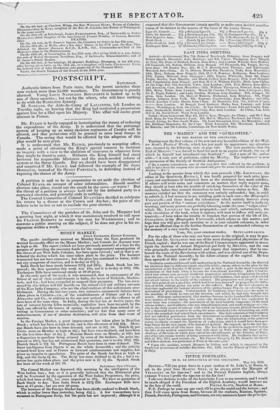THE " MAIDEN" AND THE " GUILLOTINE."
TO THE EDITOR OF THE SPECTATOR.
Turning over the first volume of the new and very beautiful edition of Sir Wal-
ter Scott's Poetical Works, which has just made its appearance, my attention was arrested by the following note at page 148. The text mentions that the Earl of MORTON " was forced to bend his neck to an engine of death, the use of which he himself had introduced into Scotland." And a note of the author adds—" A rude sort of guillotine, called the Maiden. The implement is now in possession of the Society of Scottish Antiquaries."
r By a curious coincidence, one of the very firm that suffered by the guillotine, is said to have been the surgeon who invented and gave his name to that more celebrated Maiden."—En.") Looking to the quarter from which this note proceeds (Mr. LOCKHART, the editor of the Quarterly Review), I was hardly prepared for such utter igno- r ince and carelessness of historical facts as the statement here made exhibits. If editors will write notes and comments on matters that really require none, they should at least take the trouble of satisfying themselves of the value of the authority, before they commit themselves to such hearsay stories as this. My
memory satisfied me that the statement was entirely unfounded ; but, in order to refresh it, I had recourse to my unfailing guide in such case—the Biographic
Universelle—and there found the information which entirely destroys every part and particle of this " curious coincidence." As the matter itself is really in- teresting, and many persons are probably labouring under the same "vulgar error" which -Mr. LOCKHART has here nropagated,—and which, unfortunately, the wide circulation of the book, when It appears, will tend to diffuse still more ex- tensively,—I have taken the trouble to translate that portion of the life of Dr. Gunrorix, in the Blographie Unirerselle, which relates to this matter; and hope that you will give early insertion to it in vour valuable columns, in order to put an effectual stop to the further dissemination of an unfounded calumny on the memory of a very worthy man. I am, Sir, your constant reader, SErruAcrarna res.
For the sake of those who may not have access to the original, it may be pre- mised, that Dr. GUILLOTIN was one of the most distinguished physicians of the French capital ; that he was one of the Royal Commissioners appointed to inves- tigate the doctrine of Animal Magnetism put forth by MESNER, and the one who principally contributed to detect and expose that imposture; that he em- braced the cause of the Revolution with ardour, and was elected one of the Depu- ties to the National Assembly, by his fellow-citizens of the capital. He was then upwards of fifty years of age.
"Guillotin conducted 'himself with moderation in the National Assembly ; he directed his attention there to different objects of public utility, among others to the plan for the organization of the Faculty of Medicine; and he took a part in the most remarkable resolutions of that body when it became the Constituent Assembly. After it had de- cided that crimes were personal, Guillotin proposed to substitute decapitation for other punishments, on the ground tlr t in the opinion of Frenchmen, that species of death did not attach infamy to the family of the criminal. The proposit ion was adopted : its au- thor then pointed out a machine, which had been long known," as proper for the inflic- tion of death, without giving any pain to the sufferer. Men of the best character at that time applauded the humane motives of the philanthropic Deputy, in selecting this instrument of punishment. Unfortunately for Guillotin, some wags gave his name to the machine of which he was not the inventor, and which he had only brought into notice. Still more unfortunately, this machine became, in the handsof the ruffians who were masters of France during two years—the duration of which was equivalent to more than two centuries—the instrument of the most horrible vengeance, of the most odious crimes ; and Guillotin, who was himself imprisoned, and ready to figure as a vic- tim in the daily scenes of carnage with which our infamous tyrants glutted themselves, had a thousand times to grieve at seeing his name attached, to the devastating axe with which the cannibals had armed their executioners. One feels astonished that Guillotin had not solicited permission from the Government to relinquish a name which from that time must have been unsupportable to him. After the termination of his political career, Guillotin resumed the functions of a physician, which it would have been per- haps better for his own repose if he had never quitted. He enjoyed, up to his last mo- ments, the esteem of all who knew him. His love for his profession suggested to him the idea of the medical association that still exists in Paris under the name of the Academy t4'31edicine, in which were united his old colleagues of the Faculty of Paris, and of her -physicians worthy of being associated with them. Dr. Guillotin died on the 26th of May 1314, aged seventy-six. Ilis Funeral Eulogium by Dr. Bourrie, his friend and fellow-student, was published at Paris in the same year."
• Upon this machine, termed Mannaia in Italian, and which is engraved in the Symbolicre Qurestiones of Achilles Bocchins, 4to., 1555, see the Travels of Father Labat in Italy.


















 Previous page
Previous page